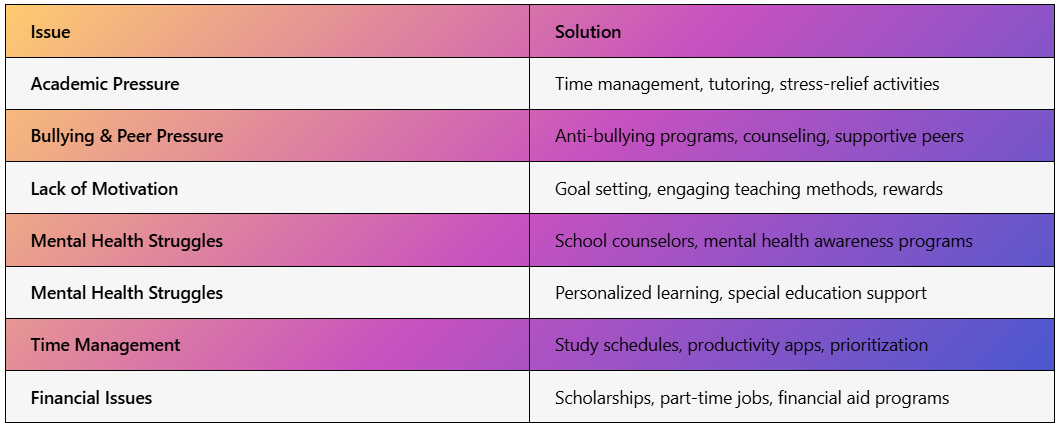
Understanding Issues Students Face in School
Understanding mental health issues in students is crucial in today’s educational landscape. Many students Issues Students Face in School of challenges, from academic pressure to social anxiety, which can significantly impact their well-being.
For instance, a recent survey revealed that nearly 30 percent of high school students reported feeling persistently sad or hopeless. This statistic highlights the pressing need for schools to address mental health proactively. Schools can create a supportive environment by implementing programs that promote mental wellness and resilience among students. To tackle these mental health challenges, students can leverage technology, particularly artificial intelligence.
AI tools can provide personalized learning experiences, helping students manage their workloads more effectively. For example, platforms that use AI can offer tailored study plans based on individual learning styles and pace. This not only reduces stress but also enhances academic performance.
Additionally, AI chatbots can serve as a first point of contact for students seeking mental health support, providing immediate resources and guidance. Looking ahead, schools of the future will likely prioritize mental health as a core component of education. By integrating mental health education into the curriculum, students will learn to recognize and manage their emotions better. Here are some key benefits of this approach:
- Improved academic performance
- Enhanced social skills
- Greater resilience in facing challenges
- Reduced stigma around mental health issues.
By fostering an environment that values mental health, schools can empower students to thrive both academically and personally.
Unlock your potential with online degrees—Learn more!
Addressing Academic Pressure and Stress
Academic pressure and stress are two of the most significant challenges students face today. With the increasing demands of coursework, extracurricular activities, and social expectations, many students find themselves overwhelmed. This pressure can lead to anxiety, burnout, and even a decline in academic performance.
For instance, a high school student juggling advanced placement classes and a part-time job may struggle to maintain a healthy balance, often sacrificing sleep and self-care in the process. Recognizing these challenges is the first step toward finding effective solutions. One way students can alleviate academic stress is by leveraging technology, particularly artificial intelligence. AI tools can assist in various ways, such as providing personalized study plans, helping with time management, and even offering tutoring support.
For example, platforms like Khan Academy use AI to tailor learning experiences based on individual progress, allowing students to focus on areas where they need the most help. This not only enhances understanding but also reduces the feeling of being overwhelmed by the curriculum. Looking ahead, schools of the future are likely to adopt more innovative approaches to education, focusing on mental health and well-being.
This could include integrating mindfulness practices into the school day, offering workshops on stress management, and creating supportive environments where students feel safe to express their concerns. By addressing academic pressure head-on and utilizing available resources, students can navigate their educational journeys more effectively and with greater confidence.
Navigating Social Media and Its Impact on Students
Navigating social media is a balancing act for students today. Platforms like Instagram and TikTok provide opportunities for creativity and connection, but they can also lead to distractions, anxiety, and cyberbullying. Many students find themselves in a cycle of comparison, which can harm their self-esteem and academic performance.
To address these issues, it is crucial for students to cultivate a healthy relationship with social media by setting boundaries, such as limiting screen time and following positive influences. One effective approach is to use social media for educational purposes. Students can join study groups, share resources, and collaborate on projects through these platforms. For example, high school students might create a private Facebook group to discuss homework and exchange helpful links, fostering community and accountability.
Additionally, students can utilize AI tools to enhance their learning experiences. From personalized study aids to virtual tutoring, AI can offer tailored support that meets individual learning needs. Looking to the future, schools are likely to integrate social media and technology into their curricula more effectively. Educators can teach digital literacy, helping students discern credible sources and understand their online presence’s implications.
By creating an environment that empowers responsible technology use, schools can equip students with the skills necessary to navigate the digital landscape. Ultimately, the aim is to transform social media from a source of stress into a valuable tool for learning and connection.
Combating Bullying and Promoting Inclusivity
Combating bullying and promoting inclusivity are critical challenges that students face today. Bullying manifests in various forms, including physical intimidation and cyberbullying, significantly impacting students’ mental health and academic success.
To address this, schools must create environments where every student feels safe and valued. One effective strategy is implementing peer support programs, such as buddy systems, where older students mentor younger ones, fostering community and belonging. Technology also plays a vital role in combating bullying.
Students can utilize AI tools for anonymous reporting of incidents, ensuring their voices are heard without fear of retaliation. Schools can analyze bullying patterns through AI, allowing for proactive interventions. Here are some key benefits of using AI in schools to enhance inclusivity:
- Anonymous Reporting: Students can report bullying without revealing their identity.
- Data Analysis: Schools can identify bullying trends and hotspots for targeted interventions.
- Resource Allocation: AI helps schools allocate resources effectively to areas needing support.
Creating a culture of inclusivity is essential in addressing bullying. Future schools should emphasize teaching empathy and respect from an early age through inclusive curricula that celebrate diversity. Real-world examples, like cultural exchange days and diversity workshops, illustrate how fostering inclusivity can lead to a harmonious school environment. By prioritizing these initiatives, we can empower students to combat bullying and thrive in a supportive atmosphere.
Enhancing Time Management Skills for Better Productivity
Enhancing time management skills is essential for students facing the complexities of modern education. With the growing demands of schoolwork, extracurricular activities, and social life, many students feel overwhelmed, leading to stress and decreased productivity.
However, by implementing effective time management strategies, students can take control of their schedules and improve their performance. A practical approach is to establish a structured daily routine that designates specific time blocks for studying, assignments, and leisure. This method not only aids in prioritizing tasks but also ensures students allocate time for relaxation, which is vital for mental health.
Technology can significantly enhance time management as well. Students can use AI-driven apps to organize tasks and set reminders. These tools analyze workloads and suggest optimal study times based on individual habits. Benefits of using AI in time management include:
- Personalized study schedules
- Automatic reminders for deadlines
- Insights into productivity patterns
By leveraging these technologies, students can streamline their efforts and concentrate on what truly matters, alleviating feelings of being overwhelmed. Looking forward, future schools are expected to incorporate advanced tools to aid students in effective time management.
Imagine classrooms equipped with AI that not only support learning but also help students develop crucial life skills like time management. As education evolves, it is important for students to embrace these changes and adapt their strategies. By focusing on improving their time management skills today, students can set themselves up for a successful academic journey and beyond.
Unlock your potential with online degrees—Learn more!
Overcoming Financial Challenges in Education

Overcoming financial challenges in education is a significant concern for many students today. With increasing tuition fees and living costs, students often juggle multiple jobs while trying to keep up with their studies. This financial strain can lead to stress and negatively impact academic performance. However, there are effective strategies to alleviate these burdens. For example, seeking scholarships and grants can greatly reduce tuition costs.
Many organizations provide financial aid based on merit or need, making it essential for students to research and apply for these opportunities early. In addition to traditional financial aid, students can utilize technology to better manage their finances. Budgeting apps can help track expenses and income, ensuring students stay within their means. Moreover, exploring part-time job opportunities with flexible hours allows students to balance work and study effectively.
Many have successfully funded their education through internships that offer both income and valuable work experience in their fields. Looking to the future, schools may implement more comprehensive financial literacy programs, equipping students with the skills to navigate financial challenges. By integrating AI tools into their studies, students can access personalized financial advice and resources tailored to their needs.
This proactive approach not only aids in managing finances but also prepares students for a more secure financial future. Ultimately, overcoming financial challenges in education requires a blend of resourcefulness, technology, and support from educational institutions.
Developing Effective Study Habits for Success
Developing effective study habits is essential for students facing the challenges of modern education. With numerous distractions and the pressure to excel, many students struggle with time management. To address this, adopting a structured study schedule can help break down workloads into manageable chunks, aiding retention and reducing anxiety around deadlines.
Another challenge is the lack of engagement in traditional learning environments. As schools evolve, technology plays a crucial role, allowing students to utilize AI tools to enhance their learning experience. AI-driven platforms can create personalized study plans, enabling students to focus on areas needing improvement and fostering a more interactive educational journey. To cultivate effective study habits, consider these practical steps:
- Set clear goals: Determine what you aim to achieve in each session.
- Create a distraction-free environment: Choose a quiet space for concentration.
- Use technology wisely: Leverage AI tools for tailored learning experiences.
- Take regular breaks: Short breaks can enhance productivity and focus.
By implementing these strategies, students can overcome challenges and set the stage for academic success. Effective study habits not only improve retention and understanding but also help balance school and personal life, making learning more enjoyable.
Building Support Systems for Student Wellbeing
Building a strong support system is crucial for student wellbeing, especially in today’s fast-paced educational environment. Students face numerous challenges, from academic pressure to social anxiety, which can significantly impact their mental health. By fostering a supportive community, schools can help students navigate these hurdles more effectively.
For instance, peer mentoring programs allow students to connect with one another, share experiences, and provide emotional support. This not only enhances their academic performance but also builds resilience against stress. Incorporating technology can also play a pivotal role in creating these support systems. With the rise of AI tools, students can access personalized learning experiences tailored to their unique needs.
For example, AI-driven platforms can help identify areas where a student may be struggling, allowing educators to intervene early. Additionally, these tools can facilitate communication between students and teachers, making it easier to address concerns and celebrate achievements. Here are some benefits of using AI in schools:
- Personalized learning paths that cater to individual strengths and weaknesses.
- Enhanced communication channels between students and educators.
- Access to a wealth of resources that can aid in academic success.
By embracing these innovations, schools can create an environment where students feel supported and empowered to thrive. As we look toward the future, envisioning schools that prioritize mental health and community engagement will be essential in addressing the challenges students face today.
Unlock your potential with online degrees—Learn more!
FAQs
-
Why do students struggle with their studies?
Students may struggle due to a lack of motivation, learning difficulties, poor study habits, or difficulty understanding the material. -
How can students improve their concentration in class?
Students can improve focus by getting enough rest, minimizing distractions, taking notes, and actively participating in lessons. -
What should students do if they are failing a subject?
They should seek help from teachers, attend extra tutoring, revise regularly, and practice good study habits. -
Why do students experience test anxiety?
Test anxiety can be caused by pressure to perform well, lack of preparation, or fear of failure. Relaxation techniques and proper preparation can help.





